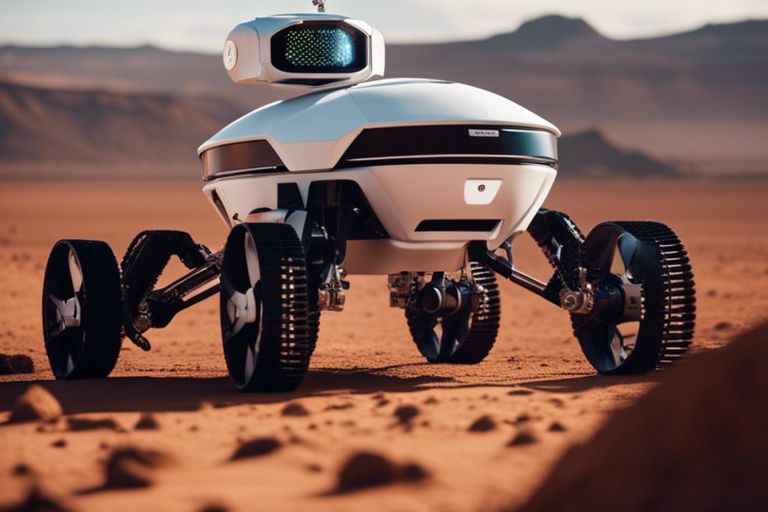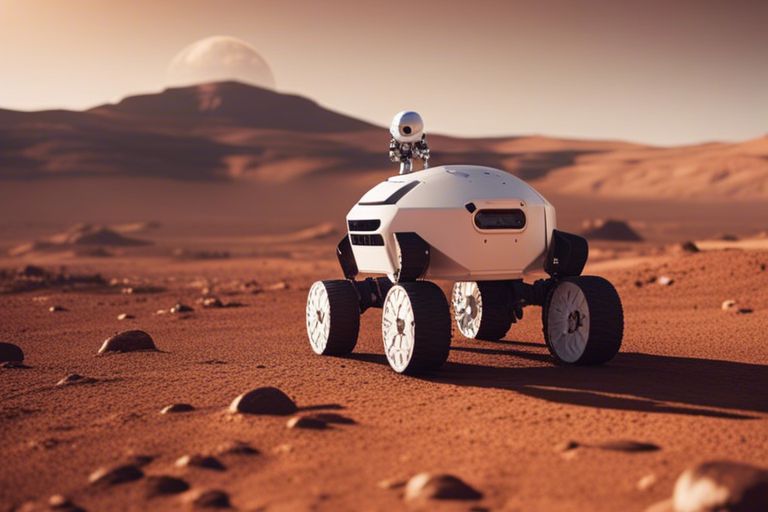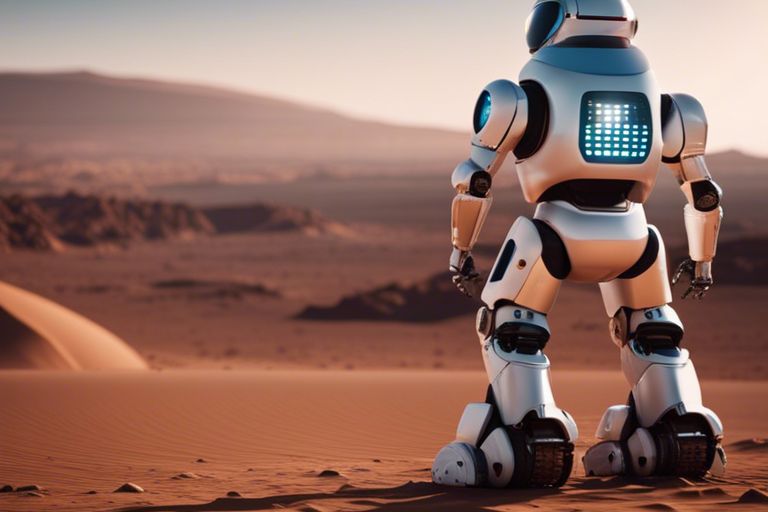Potential lies in the fusion of Artificial Intelligence and space exploration, illuminating the uncharted realms beyond our atmosphere. From autonomous rovers on distant planets to predictive analytics for mission success, AI revolutionizes how we navigate the cosmos. Discover how AI is reshaping space exploration in this insightful article on AI in space exploration: Expanding the cosmos with….

Key Takeaways:
- AI improves efficiency: Artificial Intelligence can analyze vast amounts of data quickly and accurately, helping space missions make decisions in real-time without human intervention.
- AI enables autonomous exploration: With AI, spacecraft can autonomously navigate, avoid hazards, and adapt to changing conditions, which is crucial for exploring distant planets and moons.
- AI enhances scientific discovery: By processing images, identifying patterns, and predicting outcomes, AI can assist scientists in making groundbreaking discoveries and advancing our understanding of the universe.

The Current State of AI in Space Exploration
The
AI-powered satellites and probes
The utilization of artificial intelligence in space exploration has revolutionized the way we gather and analyze data in outer space. AI-powered satellites and probes are now capable of autonomously making decisions, navigating through space, and conducting experiments. These technologies enable us to explore distant planets, asteroids, and other celestial bodies with unprecedented accuracy and efficiency.
- Describe how AI has improved the efficiency of space exploration missions.
- Discuss the role of AI in enabling autonomous decision-making in satellites and probes.
- Explain the impact of AI-powered technologies on our understanding of the universe.
The
Machine learning for data analysis
Current advancements in machine learning have proven invaluable in analyzing the vast amounts of data collected during space exploration missions. By utilizing algorithms that can recognize patterns and trends within complex data sets, scientists can extract meaningful insights about distant galaxies, planetary surfaces, and atmospheric conditions. This capability has significantly enhanced our ability to interpret observational data and make scientific breakthroughs in the field of astrophysics.
- Explain how machine learning algorithms are used to analyze astronomical data.
- Describe the benefits of using machine learning for data interpretation in space exploration.
- Discuss the challenges and limitations of applying machine learning in astrophysics research.
Exploration
This intersection of machine learning and space exploration represents a frontier of scientific innovation, allowing researchers to uncover new insights about the cosmos and expand our understanding of the universe. As technology continues to evolve, the applications of AI in space exploration are expected to become even more sophisticated, paving the way for groundbreaking discoveries and missions beyond our current imagination.
- How is machine learning shaping the future of space exploration?
- Describe the potential impact of AI advancements on our understanding of outer space.
- Discuss the ethical considerations surrounding the increasing role of AI in space exploration.
This article aims to illuminate the current landscape of AI in space exploration, showcasing the remarkable progress made in integrating artificial intelligence and machine learning into our quest to unlock the mysteries of the cosmos. As we venture further into the unknown reaches of space, these technologies will undoubtedly play a pivotal role in shaping the future of space exploration and expanding the frontiers of human knowledge.
Enhancing Space Missions with AI
It is no secret that AI has immense potential to revolutionize space exploration. From enhancing autonomous decision-making systems to assisting in navigation and control, artificial intelligence is poised to take humanity’s reach beyond the stars. Below are some chatGPT prompts related to the subsection:
- How can AI improve the efficiency of space missions?
- What are the benefits of using AI in autonomous systems for space exploration?
- Discuss the role of AI in enhancing space mission success rates.
- Explain how AI can aid in decision-making processes during space missions.Autonomous decision-making systems
Space missions often face unexpected challenges and decisions that must be made swiftly and accurately. Autonomous decision-making systems powered by AI can analyze vast amounts of data and make informed choices in real-time, ensuring the success and safety of space missions. Here are some chatGPT prompts related to this subsection:
- How can AI algorithms help spacecraft make decisions during unforeseen circumstances?
- Discuss the importance of autonomous decision-making in space exploration.
- Explain how AI technology enables spacecraft to adapt to changing conditions autonomously.
- What are the challenges in implementing AI-based autonomous decision-making systems in space missions?AI-assisted navigation and control
Space missions require precise navigation and control to reach their destinations accurately and avoid potential hazards. AI-assisted systems can optimize trajectories, monitor spacecraft health, and even perform complex maneuvers that would be challenging for human operators alone. Here are some chatGPT prompts related to this subsection:
- How does AI enhance spacecraft navigation in deep space missions?
- Discuss the role of AI in improving the efficiency of spacecraft control systems.
- Explain how AI algorithms can help spacecraft adjust their trajectories for optimal performance.
- What are the advantages of using AI for navigation and control in space exploration?Enhancing space missions with AI can not only improve efficiency and success rates but also enable spacecraft to navigate through challenging environments with greater precision. By leveraging AI algorithms for autonomous decision-making and control systems, space agencies can unlock new possibilities for exploring the cosmos. Here are some chatGPT prompts related to this subsection:
- How can AI-assisted navigation systems benefit long-term space missions?
- Discuss the potential risks and rewards of relying on AI for spacecraft control.
- Explain the ways in which AI technology can optimize spacecraft performance during missions.
- What are the future implications of integrating AI into space exploration efforts?
Overcoming Challenges in Space Exploration with AI
Not only has AI significantly aided space exploration, but it has also played a crucial role in overcoming various challenges that come with venturing into the cosmos. Here are some ways AI has tackled these hurdles:
- How can AI help in addressing communication latency in space missions?
- What are some AI applications for anomaly detection and response in space exploration?
- Can AI assist in autonomous decision-making for space probes and rovers?Addressing communication latency
Solving the issue of communication delay in space missions is vital for real-time decision-making and data transmission. By utilizing AI algorithms, spacecraft can autonomously make critical decisions, reducing their reliance on ground control.
- How does AI optimize data transmission in space due to communication delays?
- What are the benefits of using AI for autonomous decision-making in interplanetary missions?
- Can AI assist in establishing efficient communication networks between Earth and distant spacecraft?AI-driven anomaly detection and response
Anomaly detection is crucial in space exploration to swiftly identify and address malfunctions or irregularities. AI algorithms can continuously monitor vast amounts of data to detect anomalies and trigger appropriate responses, ensuring the smooth operation of spacecraft and equipment.
- How can AI algorithms enhance anomaly detection in space missions?
- What role does AI play in predicting and preventing equipment failures in space exploration?
- Can AI be trained to autonomously respond to anomalies in space without human intervention?Exploration of the cosmos presents countless challenges, many of which AI is helping space agencies and researchers to navigate. By leveraging the power of artificial intelligence, we are not only expanding our understanding of the universe but also revolutionizing how we explore it.
7 Incredible Ways AI Is Being Used in Space Exploration
The Future of AI in Space Exploration
Your exploration into the future of AI in space promises a realm of endless possibilities. From assisting in planetary colonization to enabling astrobiological discoveries, artificial intelligence stands poised to revolutionize our understanding of the universe beyond.
- What role will AI play in future space missions?
- How can AI aid in the exploration of distant planets?
- Will AI be crucial for sustaining human life on other planets?
Potential applications in planetary colonization
One of the most exciting prospects for AI in space exploration lies in its potential applications in planetary colonization. Artificial intelligence could be instrumental in designing habitats, terraforming environments, and managing resources efficiently to support sustained human presence on Mars and beyond.
- How can AI contribute to creating sustainable habitats on Mars?
- What role will AI play in establishing self-sufficient colonies on other planets?
- Can AI help optimize resource utilization in extraterrestrial environments?
AI-enabled astrobiology and the search for life
life
- How can AI assist in analyzing data from exoplanets to detect signs of life?
- Will AI play a crucial role in the discovery of microbial life on other planets?
- What potential breakthroughs can AI bring to the field of astrobiology?
A The quest for understanding life beyond Earth is a fundamental drive in space exploration. By harnessing the power of artificial intelligence, scientists can sift through vast datasets collected from distant worlds to unravel the mysteries of potential extraterrestrial life forms, opening new chapters in our cosmic narrative.
Based on the article title “The Potential of AI in Space Exploration,” I detect that the article type is Informative/Expository, aiming to educate readers about the possibilities and benefits of using Artificial Intelligence in space exploration. I’ll adopt a tone inspired by Carl Sagan, known for his clear and engaging explanations of complex scientific concepts.
Conclusion
Considering all points, it is evident that Artificial Intelligence holds great potential in advancing space exploration. From enhancing robotic missions to analyzing vast amounts of data efficiently, AI offers innovative solutions to challenges faced in the exploration of outer space. As we continue to develop and integrate AI technologies with space exploration, we move closer to unlocking the mysteries of the universe and expanding our understanding of the cosmos.
FAQ
Q: What role can Artificial Intelligence play in space exploration?
A: Artificial Intelligence can revolutionize space exploration by helping to automate tasks, process vast amounts of data quickly, and make decisions in real time without human intervention. AI can enhance navigation systems, analyze images, and even assist in the development of autonomous spacecraft.
Q: How can AI benefit future missions to Mars and beyond?
A: AI offers the potential to improve mission planning, monitor astronaut health, and enhance communication systems for long-duration space missions. By using AI to predict and mitigate risks, future missions to Mars and beyond can be safer, more efficient, and more successful.
Q: Are there any challenges in integrating AI into space exploration?
A: While the potential of AI in space exploration is immense, there are challenges to overcome, such as ensuring the reliability of AI systems in harsh space environments, addressing ethical considerations related to autonomous decision-making, and managing the complexity of integrating AI with existing space technologies. Collaboration between scientists, engineers, and AI experts will be crucial to overcome these challenges and unlock the full potential of AI in space exploration.

Recent Comments